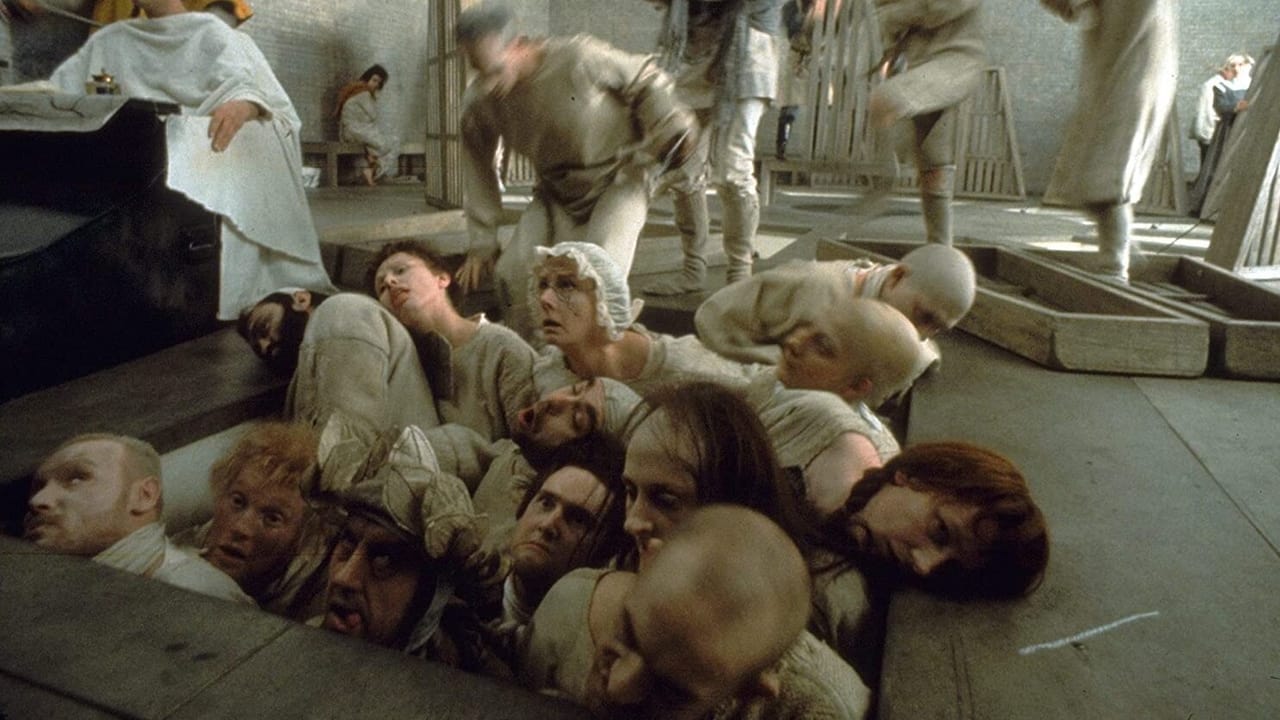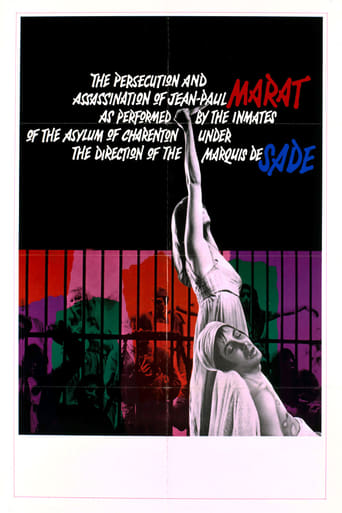

Perhaps because I am old, and lived through the 60s, and was a French major - I think in order to truly understand this play you have to truly understand the revolution of the 60s vis a vis the French Revolution. In both instances the participants thought they were doing the best thing possible for all the people, and in both instances the participants lost sight of their original goals. Jean Paul Marat is ultimately vilified for the people he killed, just as the Black Panthers, the Weathermen, the Yippies and other groups; and in the end, regardless that their actions hurt more than they helped, everyone was trying to do their best for the people. I mean to say, Marat is a pathetic character, condemned by nature to suffer his last days with a debilitating skin disease. In the case of the 60s radicals, we have been condemned to see the world we envisioned turn away from our ideals and turn us into caricatures and stand up routines. At least those of us who didn't wind up going to prison or dying outright. The play is wonderful, and speaks truth through the mouths of those condemned to an insane asylum. We are forced to re-evaluate our notion of insane.
... View MorePeter Brook, for many years the artistic director of the Royal Shakespeare Company, has more than once astounded the theater world with his interpretations of familiar plays by Shakespeare and others. Here's the chance for movie-goers to witness his transformative skills in action. Marat/Sade, which I'd seen previously on stage, is a Brechtian political drama about the French revolution performed in a madhouse under the direction of the notorious Marquis de Sade. Brook's retelling takes advantage of the setting by emphasizing the particular insanities of the major players. Marat, portrayed by Ian Richardson, is coldly rational except when he's not. Patrick Magee's de Sade reflects that personality's obsession with cruelty. But the real brilliance of Brook's choices is captured best by Glenda Jackson, who appears as a victim of narcolepsy cast in the role of Charlotte Corday, Marat's assassin. Jackson's character can barely rouse herself to perform. She's confused. Her diction is odd. She's not convincing as Corday, nor is she supposed to be. She's thoroughly convincing, however, an insane person playing someone who is obsessed with Marat. Other brilliant performances are turned in by Michael Williams as the Herald who announces key scenes; Robert Landon Lloyd as Roux a cleric turned revolutionary who is seen most of the time in a strait-jacket because of his violent behavior, John Steiner as Monsieur Depere, a sexual predator who lusts after Jackson's Corday and a quartet of three men and a woman in comedia del' arte garb who comment on the action in song and verse.It is a bizarre film, difficult to watch at times, but brilliant in its execution. I do not believe there is another director alive or dead who could have done what Brooks did with this script and this talented group of actors. Too bad he didn't do more movies.
... View MoreThe Persecution and Assassination of Jean-Paul Marat as Performed by the Inmates of the Asylum at Charenton Under the Direction of the Marquis de Sade.The title pretty much sums up this powerfully visualized "play", set in 1808, during France's supposed success rate at educating the insane. This play by de Sade which is a scathing dissection of the French Revolution using Marat as the voice for the war as the Marquis takes the role against it. Morality obviously being this is a play from Marquis de Sade is also under the microscope as those that are insane fulfill certain roles under the celebrated masochist's direction. Monsieur Coulmier(Clifford Rose)is the mediator watching de Sade's behavior regarding what his script can and can not say. Blasphemy in this supposed golden age of France can not be warranted so Coulmier, with the assistance of nuns and guards inside, try to keep the deranged--and de Sade--in check.The play itself is told through not only the characters written on page, but from the insane themselves who often intervene on their own behalf. The ending is a fine slap in the face of the so-called success the French asylums seemed to have employed as the maniacs, after finishing, attack all the normal folk inside(two aristocratic women are audience members inside the cell--what were they thinking?)as Marquis relishes the chaos with glee.The staged film is disturbing, bleak, but profound and spellbinding. The way the camera moves throughout the cell(and several shots through the bars and on the darkened audience outside the cell)is hypnotic and deeply luridly fascinating. The cast is so good, they really convinced me I was watching a directed play using loonies!
... View MoreMARAT/SADE is the film version of a play that arose from an actor's workshop exploring various theatrical theories expressed by French actor-director-writer Antoine Artard, who extolled a style of performance he described as "theatre of cruelty"--which, broadly speaking, consists of an assault upon the audience's senses by every means possible. Ultimately, and although it makes effective use of its setting and the cinematography mirrors the chaos expected of such a situation, the film version of MARAT/SADE is less a motion picture than a record of a justly famous stage play that offers a complex statement re man's savagery.The story of MARAT/SADE concerns the performance of a play by inmates of an early 1800s insane asylum, with script and direction by the infamous Marquis de Sade. (While this may sound a bit far-fetched, it is based on fact: de Sade was known to have written plays for performance by inmates during his own incarceration in an asylum.) The story of the play concerns the assassination of the revolutionary Marat by Charotte Corday, but the play itself becomes a debate between various characters, all of which may be read as in some way intrinsically destructive and evil. Since all the characters are played by mentally-ill inmates of the asylum (the actor playing Marat, for example, is described as a paranoid, and the actress playing Corday suffers from sleeping sickness and melancholia), the debate is further fueled by their insanity, unpredictability as performers, and the staff's reactions to both their behavior and the often subversive nature of the script they play out.Patrick Magee as de Sade, Glenda Jackson as the inmate playing Corday (it was her breakout performance), and Ian Richardson as the inmate playing Marat offering impressive performances; indeed, the ensemble cast as a whole is incredibly impressive, and they keep the extremely wordy script moving along with considerable interest. Even so, it will be obvious that the material works better as a live performance than as a film, and I do not recommend it to a casual viewer; its appeal will be largely limited to the literary and theatrical intelligentsia. The DVD includes the original theatrical trailer, but beyond this there are no extras of any kind.Gary F. Taylor, aka GFT, Amazon Reviewer
... View More